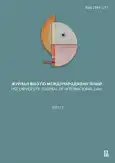Commentary on the Judgment of the International Court of Justice of 30 March 2023, On Certain Iranian Assets (Islamic Republic of Iran v. United States of America)
- Authors: Polshakova V.V.1
-
Affiliations:
- Kovalev, Tugushi and Partners
- Issue: Vol 1, No 3 (2023)
- Pages: 98–111
- Section: Commentary
- URL: https://journal-vniispk.ru/2949-5717/article/view/319979
- DOI: https://doi.org/10.17323/jil.2023.18752
- ID: 319979
Cite item
Full Text
Abstract
This article discusses the judgment of the International Court of Justice in the case Certain Iranian Assets (Islamic Republic of Iran v. United States of America) concerning the US’ alleged violations of Treaty of Amity, Economic Relations and Consular Rights, which had been concluded between the US and Iran on 15 August 1955. The author discusses the features and historical background of the US counter-terrorism legislative policy, as well as the subsequent judicial responses of the US legislative and executive bodies imposing restrictive measures against Iran. Notably, despite the fact that there are currently about 300 multilateral and bilateral treaties providing for the jurisdiction of the ICJ in the event of a dispute, only a handful of disputes concerning economic sanctions have reached the ICJ, making the recent judgment particularly important. The article mirrors the Court’s reasoning, starting with questions of jurisdiction and admissibility with respect to the legal status of the Central Bank of Iran Markaziand the exhaustion of local remedies. The author concludes that in its characterization of Markazi, the Court leaned towards a conservative understanding of the Central Bank’s status as a state organ, offering clear argumentation on the understanding of the nature of central banks in international law. The author also discusses substantive issues, including the status and applicability of the “clean hands” doctrine in international law, the “abuse of right” doctrine, the arms production and security exceptions, the legal personality of Iranian companies, and discrimination. In its judgment the Court even considered international investment law issues,i.e., the standards of fair and equitable treatment and reasonableness. The author concludes that the Court applied the “reasonableness” standard as a test for determining the unlawfulness of expropriation, thus deviating from the standard accepted in international law. The article also discusses the dissenting opinions and declarations written by 13 of the 15 ICJ judges in the case. Finally, the author raises a question on whether the Court’s findings constitute the revolutionary approach at identifying the legal borders of economic sanctions, or rather a cautious one aimed at finding the balance between legal and fair.
About the authors
Victoria Vladimirovna Polshakova
Kovalev, Tugushi and Partners
Email: polshakovavv@yandex.ru
ORCID iD: 0009-0008-8121-839X
At the time of acceptance of the article for publication: Junior Associate, “Kovalev, Tugushi and Partners”, Moscow, Russia
References
- Brownlie I. (2008). Principles of Public International Law, 7th ed. New York: Oxford University Press. DOI:https://doi.org/10.2307/2201449
- Cheng B. (1953). General Principles of Law as Applied by International Courts and Tribunals. New York: Cambridge University Press. DOI:https://doi.org/10.1163/9789004386242_019
- Goldmann M. (2022). Hot War and Cold Freezes. Verfassungsblog on matters constitutional. Available at:https://verfassungsblog.de/hot-war-and-cold-freezes/(accessed: 02.01.2024).
- Herik L. (ed) (2016). Research Handbook on UN Sanctions and International Law. Cheltenham, UK: Edward Elgar Publishing. DOI:https://doi.org/10.1163/22116133-02701040
- Kiss A. (2006). Abuse of Rights. Max Planck Encyclopedia of Public International Law Online. Available at:https://opil.ouplaw.com/display/10.1093/law:epil/9780199231690/law-9780199231690-e1371(accessed: 02.01.2024). DOI:https://doi.org/10.1093/law:epil/9780199231690/e1371 doi: 10.1093/law:epil/9780199231690/law-9780199231690-e1371(accessed:
- Koskenniemi M. (2005). From Apology to Utopia: The Structure of International Legal Argument, New York: Cambridge University Press. DOI:https://doi.org/10.1017/CBO9780511493713
- Lauterpacht H. (1947). Recognition in International Law, London: Cambridge University Press. DOI:https://doi.org/10.1017/s0008197300084178
- Meyer J. (2009). Second Thoughts on Secondary Sanctions. University of Pennsylvania Journal of International Law, vol. 30, pp. 905–968.
- Schwebel M. (2009). Clean Hands, Principle. Max Planck Encyclopedia of Public International Law Online. Available at:https://opil.ouplaw.com/display/10.1093/law:epil/9780199231690/law-9780199231690-e18?prd=EPIL (accessed: 02.01.2024). DOI:https://doi.org/10.1093/law:epil/9780199231690/e18 doi: 10.1093/law:epil/9780199231690/law-9780199231690-e18?prd=EPIL
- Voon T. (2019). The Security Exception In WTO Law: Entering a New Era. American Journal of International Law, vol. 113, pp. 45–50. DOI:http://doi.org/10.1017/aju.2019.3 doi: 10.1017/aju.2019.3
Supplementary files








